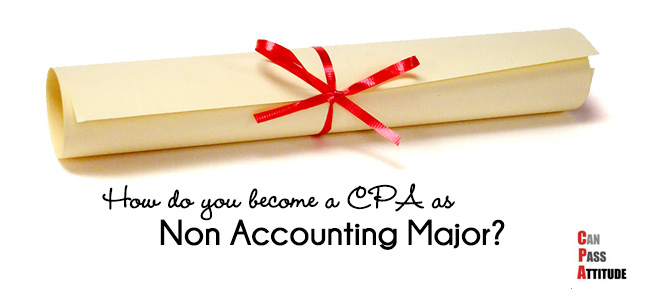- You are here:
- Home »
- Blog »
- CPA Requirements »
- CPA for Non Accounting Majors: Issues and Solutions
CPA for Non Accounting Majors: Issues and Solutions

The US CPA qualification is a globally recognized credential that is useful not only to auditors but also to financial professionals. Is earning the CPA for non-accounting majors and non-accountants a possibility?
It is Getting Tougher … A Lot Tougher
I am an Economics major and only took 1 quarter (2 credit hours) of basic accounting courses at school, but I managed to become a CPA by taking extra courses.
I am a living example of how a non-accounting major can become a Certified Public Accountant. State Boards, however, have been tightening up the rules. So, we need to find creative ways to achieve our goals.
The CPA Exam Requirements
In order to become a CPA, you’ll need to fulfill the 3Es:
- Education
- Exam
- Experience
For education, you must have at least a 4-year bachelor’s degree together with minimum accounting and business credit hours, as well as 150 credit hours of general higher education. For the exam, you need to pass all 4 parts of the Uniform CPA exam. And lastly, for the experience, you’ll be completing 1 to 2 years of experience that is relevant and properly verified.
In short, for non-accounting majors, the bottleneck is likely:
- The minimum accounting credit hours
- The 150 credit hour requirement
- Relevant experience
1. Fulfill the Minimum Accounting Credit Hours
The most logical way to get around is to pick a state that requires the least accounting courses:
- Maine: 15 credit hours
- Hawaii: 18 credit hours
- Georgia: 20 credit hours
- Massachusetts: 21 credit hours
- Alaska: there is a path for non-accounting majors
Here is the catch:
Maine. They have lenient accounting educational requirements, but much stricter experience requirements. Maine asks for at least 2 years of public accounting experience with 4,000 hours of audit compilation.
Georgia. The state board requires these 18 credit hours to be upper-division courses, meaning they only count the intermediate and advanced courses, the ones offered in the third or fourth year of college. In practice, you will need to take a lot more than the required 18 credit hours in accounting to get qualified.
Massachusetts. MA has specific rules on which course to take. In this case, the coursework must include financial accounting, audit, management accounting, and taxation.
Alaska. Alaska requires 15 accounting credit hours for accounting majors, 24 hours for those concentrating in Accounting. There is even a path for non-accounting majors (<15 accounting credits) but the candidate MUST have at least 1 year of public accounting experience.
As you see, there are quite a few restrictions from these state boards. So let’s take a look at the second option.
2. Make Up for Accounting Courses + Satisfy the 150 Hour Rule
Remember that I mentioned the 150 credit hours of general higher education? This is part of the CPA education requirements, meaning that if you have a standard 4-year bachelor’s degree, that is, 120 credit hours of education, you still need to get 30 extra credits to qualify. Thankfully, for these 30 credit hours, it can be non-degree courses and in any discipline as long as they are taken from a regionally accredited educational institution.
If you are lacking both the 30 credit hours and some accounting courses, then you might solve the two issues together with one solution — take additional accounting courses.
This way, you can reach the 150 credit hours AND fulfill the necessary accounting credits at the same time. The studying helps directly in your CPA exam preparation as well.
Once you reach the standard requirement, you have a lot more state boards to choose from, many with flexible working experience requirements that can accelerate your path to become a fully licensed CPA.
3. Complete the Experience Requirements
As a non-accounting major, chances are that you may not be working as an accountant. If this is the case, then you might need to check out the specific experience requirements before proceeding.
These days, almost all state boards accept a more general definition of relevant experience – public accounting is the most relevant, but accounting in corporate and governmental agencies are now counted. In some cases, academic positions in universities can also be accepted.
To find out more about the experience requirements, potential obstacles and solutions, please check out this link with further explanation on rules and remedies.
Question: Can I Get a CPA with a Finance or Economics Degree?
It depends on how many accounting and business courses you have taken, and how willing you are to fulfill the remaining requirements.
Finance Majors
For example, for most finance majors, you are fine with the minimum number of business credit hours. If you also took the time to take some accounting courses as well, you aren’t far off.
Since you may need to work on the 150 credit-hour rule anyway, the easiest way is to make up for those remaining accounting classes in community colleges or other accredited educational institution. Most state boards are okay with community colleges, but make sure you double-check as states such as New York require the core accounting classes to be taken in four-year colleges.
Economic Majors
In general, it is tougher because economics and accounting have very few common classes. It is however doable (as mentioned above, I am an economics major). There are no shortcuts; you simply have to take enough accounting courses to reach the minimum requirement. The good thing is that new knowledge should be really helpful in your FAR and AUD exams. As an Econ major, you are familiar with many topics in BEC.
I am Too Old / Too Busy for This. Are There Alternatives?
You might want to check out other global qualifications in accounting and finance.
The Certified Management Accountant (CMA) certification, for example, welcomes bachelor degree holders in any discipline.
The Chartered Financial Analyst (CFA) designation has even more flexible exam requirements.
In both cases, it helps to have basic knowledge of accounting, but you can work hard and catch up once joining the program.
For Your Further Reading
- How to take extra accounting courses to fulfill the 150-hour requirements
- States with flexible working experience requirement
- 50 most sought-after questions from CPA candidates
- CPA Pass Rates by School: Top programs for public accounting
Ask me a question below, or sign up for my free e-course to learn about the CPA exam application process, and tips on how to get qualified and pass the exam. I have two versions designed for candidates with different backgrounds:
 |
 |
| For US Candidates (Those with US degrees, or graduate/live/work in the US) |
For Intl Candidates (Those who study abroad, or graduate/live/work outside of the US) |
About the Author Stephanie Ng
I am the author of How to Pass The CPA Exam (published by Wiley), and I also passed all 4 sections of the CPA Exam on my first try. Additionally, I have led webinars, such as for the Institute of Management Accountants, authored featured articles on websites like Going Concern and AccountingWeb, and I'm also the CFO for the charity New Sight. Finally, I have created other accounting certification websites to help mentor non-CPA candidates. I have already mentored thousands of CPA, CMA, CIA, EA, and CFA candidates, and I can help you too!

